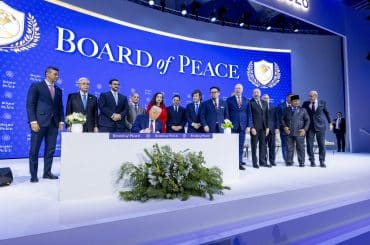The leadership of South African Jewish community has retreated in shame over the barring of Judge Goldstone from his grandson’s barmitzvah. In a statement released late Friday afternoon it was confirmed that Judge Goldstone would attend the event and that no protests would take place.
The international embarrassment that has followed the disgraceful ‘effective barring’ of Goldstone has no doubt contributed to this reversal. Whilst we should celebrate this victory thought should be given to the manner in which these events unfolded. The recent capitulation of the community leadership does not excuse their previous behaviour.
Following the initial media reports the Chief Rabbi, South African Zionist Federation and South African Jewish Board of Deputies released statements that were equivocal and disingenuous attempting to argue that no barring had taken place. Further they asserted that the SAZF and Chief Rabbi had merely "interacted" with the family and facilitated a “compromise” where Justice Goldstone would refrain from attending in order not to mar the occasion. Despite the polite sounding words this should be understood as having brought enough pressure to bear on the family in order to achieve this outcome.
Subsequently Chief Rabbi Goldstein has publically voiced his support for the “the eternal principle of open synagogues” and therefore Goldstone’s ability to attend the ceremony. However Goldstein attempts to rehabilitate his image it must remember that Goldstone himself has said that the Chief Rabbi brazenly politicized the occasion and that there was a deep incongruence between his rhetoric and the manner in which the family was treated.
Equally it must be remembered from whence the threats to protest originated. Rabbi Moshe Kurtstag, the Head of the Beth Din (the highest body of religious authority in the community), was originally quoted as saying: “I heard also that the SAZF wanted to organise a protest outside the shul – (there were) all kinds of plans. But I think reason prevailed.” This was confirmed by Harelle Isaacs, speaking on behalf of the Beth Hamedrash Hagadol, in the Cape Times (Friday 16 April 2010) who said that “there will probably be a protest by the SAZF”. Avrom Krengel, the chairperson of the SAZF, was then quoted in the Cape Times (Monday 19 April 2010) as saying they would protest should Goldstone change his mind and attend.
Numerous leaders, including Ze’ev Krengel, the chair of the SAJBOD, have defended the legitimacy of protest action as part of exercising the right of freedom of speech (Jewish Report 23 April 2010).
Defending freedom of speech, however, does not mean that leaders should sanction protest action at any opportunity. The right to freedom of speech is sacrosanct but we are entitled to decry the exercising of this right when we consider it grossly inappropriate. To choose a random example: we are entitled to protest outside the house of a dying man but this may be unnecessarily cruel and therefore legitimately discourage (not forbidden) by responsible leaders.
What the community leaders should have done:
1. Unequivocally denounced and distanced themselves publically from any people or group planning to protest at a child’s bar mitzvah. This would have isolated the protesters and turned them into a small group of unsanctioned radicals.
2. Ensured that the protesters, whilst being allowed to exercise their right to freedom of speech, where not allowed access to the synagogue grounds as it may disrupt the peaceful religious proceedings.
3. Assuming that the protesters did not seek permission from the city council and police, as is necessary to hold any legal demonstration, the security and leadership could politely insist they hold their demonstration a safe distance away from the synagogue so as not to disrupt. Legally they would be entitled to call the police but this would be unnecessarily heavy handed.
4. Supported Justice Goldstone’s religious right to get an “honour” in the synagogue.
5. Refrained from visceral personal attacks on Goldstone, for example Krengel’s reported remark, at a SAZF meeting on 14 March 2010, that Goldstone was the worst thing to happen to the Jews since the Inquisition.
6. Should they wish to go the “extra mile” and demonstrate real support for diversity in the community, as they often say they do, they could have personally attended the ceremony.
The original position of the community leadership implied that they were powerless to prevent community members for legitimately exercising their right to freedom of speech. The recent reversal says exactly the opposite.
The fact remains that the community leadership failed in their duty to promote civil communal life and deal honestly with their constituents. Under their watch one of the most powerful community organizations (the SAZF) actively sought to protest at a child’s bar mitzvah. The initial response gave a deliberately distorted view of their role and the nature of the “interaction” with the Goldstone family. Now they have change their position but failed to apologize or take responsibility for the harm done.
What emerges is a picture of community leaders that are dishonest bullies who ignore common decency in pursuing their narrow ideological goals. They have actively fostered intolerance and conflict in the community and failed to take responsibility for their actions. Their policy reversal is not commendable but simply the only decent thing to do.
Gilad Isaacs
New York, ex-Cape Town

